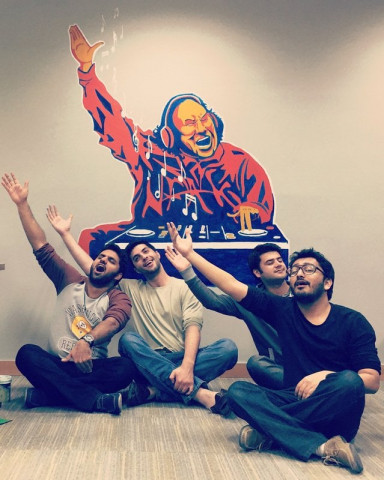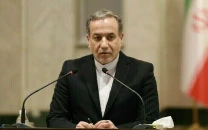Patari takes a hit as country's biggest record label threatens legal action
EMI Pakistan asks music streaming website to take down all its music

PHOTO: PATARI
Patari, an invite-only website, allowed people to choose and stream any song from a large collection of Pakistani music. The venture took off instantly. For those who had seen the rise of Pakistani pop music in the 90s, the songs came flooding back in a wave of nostalgia. Those who yearned for finer wine reveled in the intoxicating voices of Nusrat Fateh Ali Khan and Mehdi Hasan, their tapes and CDs lost to time. The younger lot sought refuge in the plethora of indie bands. Patari had come to save the day. And in the process forgot to save itself.
Read: Why piracy is a non-issue for the music industry
EMI Pakistan has asked Patari to remove all of its content from the website. This has practically stripped Patari as EMI Pakistan holds licences to around 60,000 Pakistani artists and almost 70% of the total music of the country. Nustrat Fateh Ali Khan, Madam Noor Jehan, Mehdi Hasan, Fareeda Khanam, Alamgir along with a major chunk of Lollywood songs are all licenced to EMI.
"I am not against Patari. I am against any portal or platform that provides illegal music," Zeeshan Chaudhry, General Manager of EMI Pakistan, told The Express Tribune. "Since they have uploaded a lot of music owned by EMI Pakistan without our consent, we have asked them to remove all the music under our label."
Co-founder of Patari, Khalid Bajwa said they have now removed all the songs from the website as per an exhaustive list provided by the label. "We have removed all the songs that EMI identified. We are in the middle of negotiations with the record label so that we can be on the same page," Bajwa told The Express Tribune.
The question of who owns the rights in Pakistan is a very murky one. Bajwa adds that often labels claim they have the rights, while artists dispute this fact. This is the same in the case of EMI. “EMI's claim of ownership of the content is in dispute (as evidenced by Mr. Sohail Rana's public notices that he owns the rights) and yet EMI continues to send out legal takedown notices for his music and claiming royalties of the same. It calls into question their practice of sending legal notices and withholding the music from entities such as those who want this music to reach the public and want the royalties to reach their rightful owner."
Bajwa said even artists like Noori and Strings asked Patari to take down their music initially, only to formalize a deal through which they can start anew, keeping Patari’s popularity in mind.
At the same time, some artists associated with EMI Pakistan have complained about Patari’s misuse of intellectual property. Not willing to divulge their names, the musicians said that even if the website is in its testing phase, it should have first gone through the proper channel.
Read: Online music service Patari's founders confident of success
Patari is learning and taking stock. A post on Patari’s official Facebook page states they do plan on monetizing the website. "Revenue being split between artists based on the number of plays their content has generated. All artists will be able to view the number of plays they have received," it said.
This though will not solve all of Patari’s problems. EMI’s demands do not end with the website removing all of its music or acquiring it illegally; they go beyond that. "For Patari to acquire any of EMI’s music they should first prove their legitimacy to us. And by legitimacy I mean that they need to ensure that all the music on their website, be it EMI’s or anyone else’s intellectual property is licenced. We cannot give our songs to any portal that features unlicenced music," said Chaudhry.
EMI Pakistan closed its operation in the late 90s and returned to the country’s music industry in 2008. Since then, it has been busy sorting out copyright infringements on TV, radio and online. So much so that it is believed the label made a comeback not to launch any new artists, but just to pocket royalties.
"That’s not true. We do plan to release new artists, but before that we need to have [a] system in place that facilitates provision of legal music and that is why we brought our concerns up with Patari," added Chaudhry.
Reiterating time and again that “EMI is not against Patari, but illegal content”, Chaudhry said it’s not just the website. Coke Studio and other major TV channels have also legally acquired the music from the label.
"We are working very closely with Coke Studio these days. When they approached us for some of our music, we made it very clear that they first need to sort out the copyright matter of the previous six seasons and we are now working hand in hand with them."
But if negotiations between Patari and EMI Pakistan do not work out, none of its music will be available on the website, confirms Chaudhry. Patari must now tread carefully, for the legal sword dangles above its head, threatening to shroud it in silence.



















COMMENTS
Comments are moderated and generally will be posted if they are on-topic and not abusive.
For more information, please see our Comments FAQ